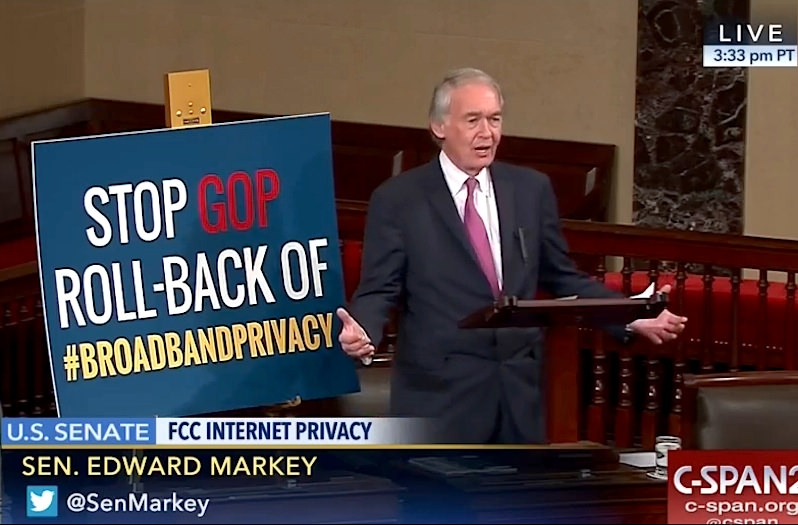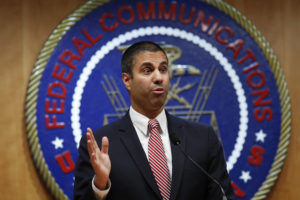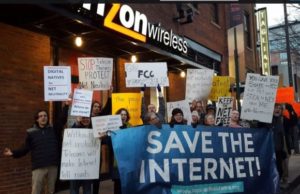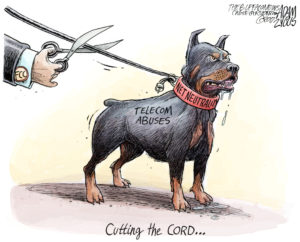Truthdigger of the Week: Ed Markey, Longtime Supporter of Net Neutrality and Consumer Privacy
The Massachusetts senator reinforced his commitment to consumer rights this week by strongly opposing a Senate resolution to roll back internet users’ privacy.
Sen. Ed. Markey delivered an impassioned defense of broadband privacy on the Senate floor Thursday. (Screen shot via CSPAN)
Every week the Truthdig editorial staff selects a Truthdigger of the Week, a group or person worthy of recognition for speaking truth to power, breaking the story or blowing the whistle. It is not a lifetime achievement award. Rather, we’re looking for newsmakers whose actions in a given week are worth celebrating.
Sen. Ed Markey, D-Mass., started fighting for net neutrality before many in Washington even knew what it was. In 2006, he authored the first Network Neutrality Act, which died in Congress. He sponsored the Internet Freedom Preservation Act of 2008, a piece of net neutrality legislation that never made it past the House Energy and Commerce Committee. He has supported the fight for broadband technology to be classified as a utility. And earlier this week, he also contested a Republican piece of legislation aimed at reducing consumer protections.
Senate Joint Resolution 34, which passed the Senate on Thursday, aims to eliminate Obama-era privacy regulations. If passed by the House, it will allow internet service providers (ISPs) to sell user data to third-party companies without consumers’ permission.
Markey argued vehemently against the resolution on the Senate floor shortly before it passed Thursday. “ISP will no longer stand for ‘Internet Service Provider,'” he declared, “it will stand for ‘Information Sold for Profit.'” Watch his full appeal in the clip below:
Markey took to Twitter throughout the week to criticize the rollback and tweeted his disappointment when the resolution passed 50-48:
.@GOP, Americans don’t want their sensitive info collected, used & sold by any 3rd party, whether that be a broadband provider or a hacker. https://t.co/nHoiTNTivi
— Ed Markey (@SenMarkey) March 23, 2017
.@GOP just made it easier for info about your health, finances & family to be used, shared & sold to highest bidder with out permission. https://t.co/41F5SY2pm5
— Ed Markey (@SenMarkey) March 23, 2017
Earlier today, @GOP voted to allow your personal information to be shared & sold to the highest bidder without your permission. https://t.co/Tc8ZLX2SLh
— Ed Markey (@SenMarkey) March 24, 2017
In the age of President Trump, internet privacy and net neutrality are more important than ever, and yet the Senate resolution has received very little media coverage.
Perhaps many in Congress still don’t fully grasp the importance of net neutrality because it’s a technical issue that’s not always easy to understand. For example, when Ajit Pai, the new Federal Communications Commission (FCC) chair, faced a Senate confirmation hearing, Sen. Ron Johnson, R-Wis., brought up the issue of net neutrality — but was only able to explain it through a “convoluted” metaphor, according to The Verge, involving neighbors wanting to build themselves a bridge but then having to share it equally with hordes.
Markey has criticized Pai for taking steps to limit low-income Americans’ access to broadband services and for rescinding other consumer protection regulations.
“It is clear that net neutrality is public enemy number one for Chairman Pai,” Markey said in a press release in February. “Instead of siding with big corporations, Chairman Pai and the FCC should explore how to fully enforce the Open Internet Order and ensure a free and open internet for everyone.”
As for internet privacy, he added in a February press call: “This battle is going to be historic, and at the end of the day, the American people are going to want their privacy protected. This is something that goes right to the heart of the 21st century. Right to the heart of the relationship between Americans and the internet.”
Markey’s congressional experience no doubt puts him in a position to understand more than most the heightened importance of protecting an open internet and consumer privacy now that Trump is in office. Markey is a member of the Senate Committee on Commerce, Science and Transportation and also sits on two subcommittees: Consumer Protection, Product Safety, Insurance and Data Security; and Communications, Technology, Innovation and the Internet. In fact, before becoming a senator in 2013, Markey spent 20 years as the chair or as a ranking member of the House Subcommittee on Telecommunications and the Internet.
Markey’s advocacy on these issues dates to the 1990s as a House member, according to Slate. “[H]e was a leader in pushing the provision of the 1992 Cable Act that made it possible for commercially viable direct-broadcast satellite companies (Direct TV, etc.) to compete with cable companies,” it writes, noting that he also played “a key role” in passing the 1996 Telecommunications Act.
Just in the past month, Markey has spoken up about protecting funding for the FCC’s E-Rate program, introduced a bill to expand internet access in developing countries and introduced a bill to limit unwanted robocalls.
“The Republican war on the free and open internet has arrived,” Markey stated after the Senate passed Joint Resolution 34 this week, “and I will continue to fight so that the few and powerful do not control the internet.”
For his decades-long defense of consumer privacy rights and his recent outspokenness on net neutrality and the FCC, Sen. Ed Markey is our Truthdigger of the Week.
With an uncertain future and a new administration casting doubt on press freedoms, the danger is clear: The truth is at risk.
Now is the time to give. Your tax-deductible support allows us to dig deeper, delivering fearless investigative reporting and analysis that exposes what’s really happening — without compromise.
Stand with our courageous journalists. Donate today to protect a free press, uphold democracy and unearth untold stories.








You need to be a supporter to comment.
There are currently no responses to this article.
Be the first to respond.